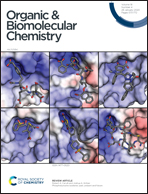An effective reagent to functionalize alcohols with phosphocholine†
Abstract
Phosphocholine is a small haptenic molecule that is both a precursor and degradation product of choline. Phosphocholine decorates a number of biologics such as lipids and oligosaccharides. In this study, an air and bench stable phosphocholine donor has been developed and evaluated with a number of alcohol acceptors. Using a one-pot, three-step sequence, (phosphitylation, oxidation, and phosphate deprotection) phosphocholine derivatives are synthesized in high yields. Of particular interest is the synthesis of miltefosine, the lone oral drug approved to treat leishmaniasis. Due to its prohibitive expense ($1500 per g), miltefosine is not accesable for the majority of the world's patients. Based on the described reaction sequence, this drug can be produced for $25 per g.

- This article is part of the themed collection: Synthetic methodology in OBC


 Please wait while we load your content...
Please wait while we load your content...